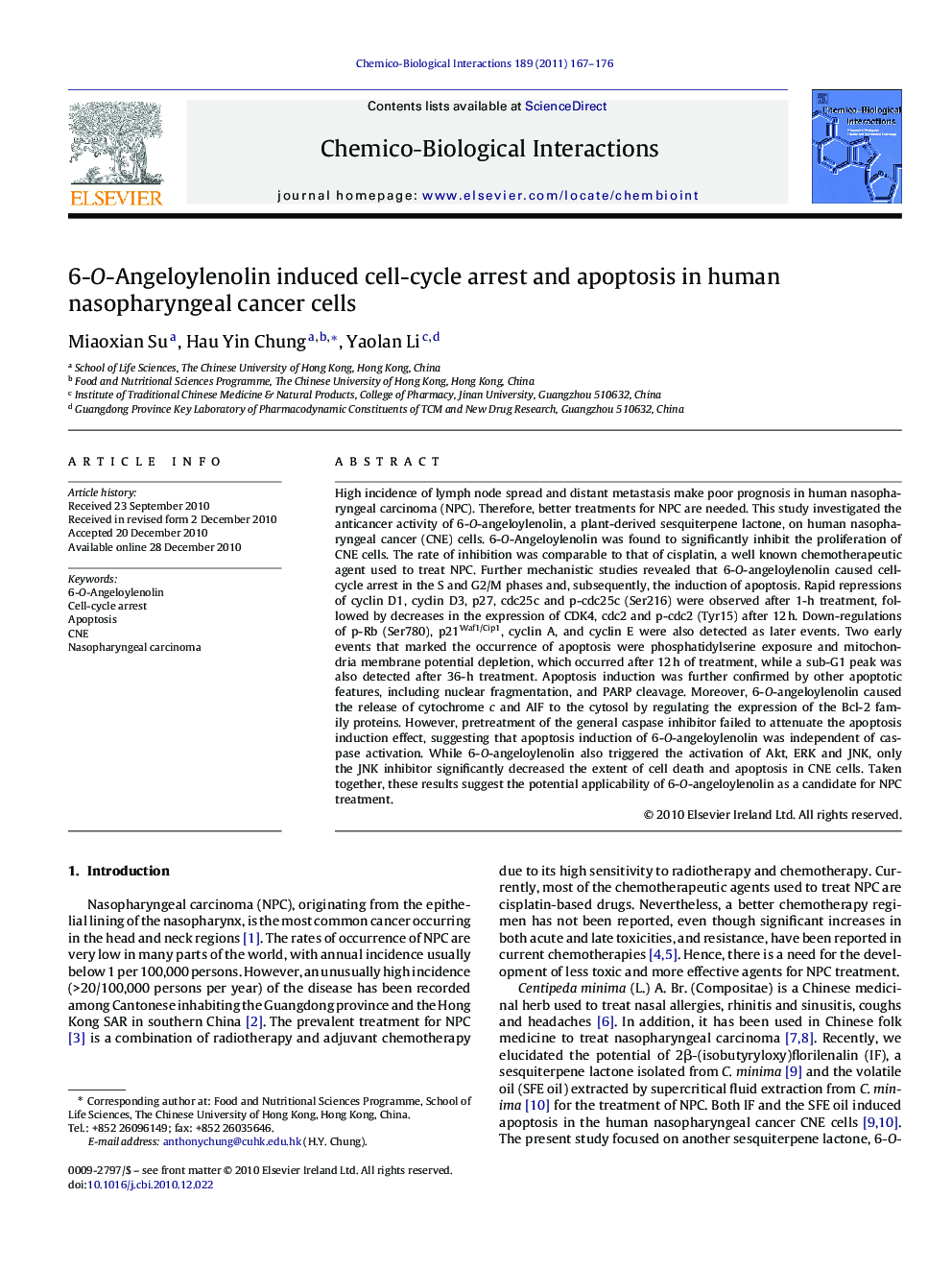| کد مقاله | کد نشریه | سال انتشار | مقاله انگلیسی | نسخه تمام متن |
|---|---|---|---|---|
| 2580993 | 1130169 | 2011 | 10 صفحه PDF | دانلود رایگان |
عنوان انگلیسی مقاله ISI
6-O-Angeloylenolin induced cell-cycle arrest and apoptosis in human nasopharyngeal cancer cells
دانلود مقاله + سفارش ترجمه
دانلود مقاله ISI انگلیسی
رایگان برای ایرانیان
کلمات کلیدی
موضوعات مرتبط
علوم زیستی و بیوفناوری
علوم محیط زیست
بهداشت، سم شناسی و جهش زایی
پیش نمایش صفحه اول مقاله

چکیده انگلیسی
High incidence of lymph node spread and distant metastasis make poor prognosis in human nasopharyngeal carcinoma (NPC). Therefore, better treatments for NPC are needed. This study investigated the anticancer activity of 6-O-angeloylenolin, a plant-derived sesquiterpene lactone, on human nasopharyngeal cancer (CNE) cells. 6-O-Angeloylenolin was found to significantly inhibit the proliferation of CNE cells. The rate of inhibition was comparable to that of cisplatin, a well known chemotherapeutic agent used to treat NPC. Further mechanistic studies revealed that 6-O-angeloylenolin caused cell-cycle arrest in the S and G2/M phases and, subsequently, the induction of apoptosis. Rapid repressions of cyclin D1, cyclin D3, p27, cdc25c and p-cdc25c (Ser216) were observed after 1-h treatment, followed by decreases in the expression of CDK4, cdc2 and p-cdc2 (Tyr15) after 12Â h. Down-regulations of p-Rb (Ser780), p21Waf1/Cip1, cyclin A, and cyclin E were also detected as later events. Two early events that marked the occurrence of apoptosis were phosphatidylserine exposure and mitochondria membrane potential depletion, which occurred after 12Â h of treatment, while a sub-G1 peak was also detected after 36-h treatment. Apoptosis induction was further confirmed by other apoptotic features, including nuclear fragmentation, and PARP cleavage. Moreover, 6-O-angeloylenolin caused the release of cytochrome c and AIF to the cytosol by regulating the expression of the Bcl-2 family proteins. However, pretreatment of the general caspase inhibitor failed to attenuate the apoptosis induction effect, suggesting that apoptosis induction of 6-O-angeloylenolin was independent of caspase activation. While 6-O-angeloylenolin also triggered the activation of Akt, ERK and JNK, only the JNK inhibitor significantly decreased the extent of cell death and apoptosis in CNE cells. Taken together, these results suggest the potential applicability of 6-O-angeloylenolin as a candidate for NPC treatment.
ناشر
Database: Elsevier - ScienceDirect (ساینس دایرکت)
Journal: Chemico-Biological Interactions - Volume 189, Issue 3, 1 February 2011, Pages 167-176
Journal: Chemico-Biological Interactions - Volume 189, Issue 3, 1 February 2011, Pages 167-176
نویسندگان
Miaoxian Su, Hau Yin Chung, Yaolan Li,